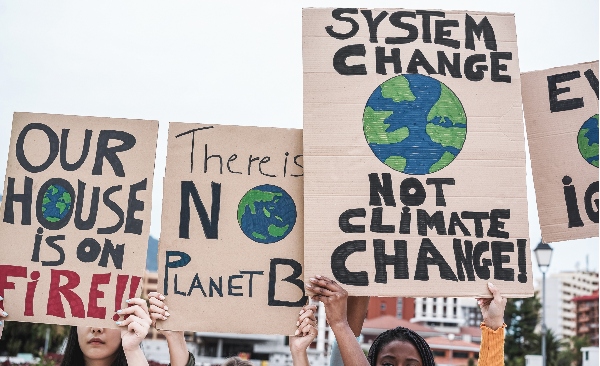What our team anticipates around the year’s biggest climate event
The 28th Conference of the Parties (COP28) kicked off in Dubai on November 30th, providing an opportunity for key stakeholders from UN member states, NGO’s, environmental experts, and the private sector to come together to address our current climate crisis. Here are some of what was top of mind as we headed there.
The COP28 agenda focus is on adaptation efforts and the intersectionality of the current climate crisis

Where COP27 had several key achievements, perhaps most notably agreement to establish the long-debated Loss & Damage Fund, COP28 is set to cover an even more ambitious set of topics. In addition to the Global Stocktake (GST), the COP Presidency has announced the Presidency’s Action Agenda which places a clear emphasis on adaptation, an important acknowledgment that mitigation efforts alone are insufficient to address the deleterious effects of climate change. Included in the agenda’s priorities are the intersections between climate and other key social issues—particularly health, food systems, and economic mobility.
Our firm’s deep experience working at intersections such as these has many on our team eagerly awaiting this year’s event, with many of our internal conversations being around key areas where we expect significant decisions and agreements.
Three key areas to pay attention to at COP28
Building on momentum from COP27, the focus on adaptation support for developing contexts is expected to yield more clarity on how the long-awaited Loss and Damage Fund will be operationalized. Additionally, significant emphasis has also been placed on two key areas of climate’s intersectionality with social impact outcomes—health and food systems.
Loss and Damage Fund
Since the early 1990s, small island nations and other developing contexts disproportionately impacted by climate change have been asking for help dealing with climate-related “loss and damage” incurred due to both acute disasters and ongoing long-term climate effects. Negotiations about loss and damage culminated with the formal creation of a Loss and Damage Fund at the close of COP27. The fund acknowledges the responsibility of developed countries to support lower income countries in addressing acute physical challenges related to the changing climate and represents a major milestone in global climate finance. By supporting developing countries to weather the most acute effects of climate change, the Loss and Damage fund will support developing economies and ensure vulnerable countries are able to continue developing in the face of the climate crisis.

With less than a month before COP28 opens, the committee tasked with developing implementation recommendations for the fund collectively agreed to temporarily house the fund at the World Bank despite considerable opposition from developing countries given the heavy historical influence of developed nations in the Bank’s governance.The committee also agreed to an initial target size for the fund of $500m—significantly below the trillions of dollars expected to be needed to address future climate disasters. Conversations are expected to continue around the issues of funding mechanisms, eligibility, and the scale of financing required. Loss and Damage is a critical mechanism for furthering equity in the response to climate change and ensuring that the many developing countries who have historically contributed the least to climate change are equipped to help their populations adapt to its impacts.
Climate Health Ministerial
Our changing climate presents both short-term and long-term threats to human health. Floods, heatwaves, and storms cause immediate injury and loss of life, while persistently higher temperatures expand the spread of vector-borne diseases. Our recent work with the WHO exploring the intersection of immunization and climate showed how immunization systems are already facing strain due to climate effects while simultaneously being a major emitter of carbon dioxide, globally contributing as much as 3 kg of CO2 per immunized child. It also showed how gender equity is a critical consideration when it comes to health, with women bearing disproportionate vulnerability to both climate impacts and immunization inequities.
The intersection of health and climate is slated to be a point of focus during COP28. COP’s first-ever climate health ministerial aims to solidify investments and policy priorities focusing on the new and rapidly shifting threat to population health imposed by our changing climate. In continuation of the adaptation theme, a wide range of government officials are expected to set out a roadmap and opportunities for action to address the increasing burden of climate change on healthcare systems. Discussions will also include the socio-economic benefits that can result from better health through climate action, highlighting not just the intersectionality of climate and health but their inherent connection to sustainable global development and prosperity.
Food Systems and Agriculture Agenda
Food systems are inherently connected to the issue of climate change. Contributing one-third of global greenhouse gas emissions, food system decarbonization is a critical consideration in reducing global GHG emissions. Additionally, rising global temperatures and changing precipitation patterns are destroying crops and threatening food security. Our team saw this firsthand in an engagement where we created a novel systems map to understand the nexus of food systems and climate change in Sub-Saharan Africa. This project showed how food loss and waste and general inefficiencies exacerbate the climate problem, but also how those same climate effects disrupt the food system, accelerate food insecurity, and drastically impact nutrition for vulnerable populations.
COP28 has set the stage for food systems to be a central focus. The COP28 Presidency has put forward the “leader-level Emirates Declaration on Sustainable Agriculture, Resilient Food Systems, and Climate Action”, which includes a voluntary commitment to incorporate food systems and agriculture into NDCs and NAPs by 2025. Additionally, the World Climate Action Summit, a side event for the main conference, will showcase countries that will put forward concrete plans to implement the declaration.
The future of climate-related impact work is intersectional

COP28 is set to bring awareness to the intersectionality of our current climate crisis, and the proposed agenda sets the stage for conversations about how climate-related interventions are also working to create impact on other important social issues. Awareness alone, however, will not create meaningful impact for communities most impacted by climate change.
The hard work of addressing climate change must include intersectional approaches and interventions, and those who are implementing interventions must consider the wide-ranging implications of their work to effectively maximize impact and improve outcomes.
Camber brings a wealth of experience and expertise to support clients in understanding and addressing the intersectional nature of climate work. Whether it’s bringing a climate lens to existing social impact initiatives or a health or shared prosperity lens to existing climate initiatives, Camber is well positioned to help clients maximize the impact of their strategies and interventions.
To learn more about the intersectionality of climate change, check out these additional perspectives:
- A Climate-Resilient Food System for Sub-Saharan Africa
- Emissions, Climate Change, and Health
- Climate Change and Infectious Disease in Africa
- Just Transition: A Climate Imperative
Based in Washington state, Zack Henderson brings over 10 years of strategy development, investment evaluation and operational effectiveness experience in climate change, global health and development, and financial technology. Zack’s prior strategic work served a range of philanthropic funders, government agencies, multilateral organizations, and for-profit organizations across a broad range of topics including go-to-market planning, impact modeling and portfolio optimization. He began his career with Camber in 2013 where he focused on a broad range of topics from nutrition and maternal and child health to education and climate change, then bridging his career to the technology sector where he led strategy and operations workstreams for a late-stage tech startup focused on financial inclusion. Zack has returned to Camber with a focus on climate change and as a recent graduate of the Terra.do Learning for Action program. He earned his BA in Finance from the University of Washington in Seattle. A Northwest convert from his childhood in the San Francisco Bay Area, Zack spends as many waking hours as possible in Washington’s mountains and forests either on a bicycle, skis, or on foot. He has a passion for learning how things work, is a do-it-yourselfer to a fault, and loves experimenting with cooking and eating.
Christopher Chang brings extensive experience supporting clients in measuring and advancing their social impact goals. He has worked with foundations and non-profit organizations on a wide range of issues including K-12 education, early childhood learning, hunger alleviation, journalism and democracy, and workforce development. Chris brings experience in qualitative and quantitative data collection and analysis methodologies, crafting measurement frameworks, and developing and implementing strategic plans. Chris holds an MBA from the University of Washington’s Michael G. Foster School of Business with a Management Science specialization and ESG certificate. Chris is an avid outdoorsman, angler, and amateur mechanic; when not working he can be found out in the mountains or working on the vehicles that get him there.
